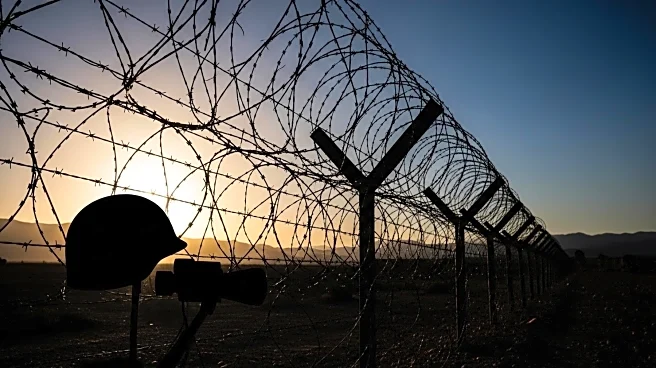What's Happening?
Clashes erupted between Pakistani and Afghan forces in a remote northwestern border region, according to Pakistan's state-run media. The media accused Afghan troops of opening 'unprovoked fire' at a Pakistani post,
prompting a strong response from Pakistani forces. The incident occurred in Kurram, a district in Khyber Pakhtunkhwa province. Pakistani forces reportedly damaged Afghan tanks and military posts. This marks the second exchange of fire between the two sides within a week. The clashes have led to the closure of all border crossings between Pakistan and Afghanistan, stranding cargo trucks on the Afghan side. The tensions have been high since the Taliban government accused Pakistan of airstrikes in Kabul and an eastern market, allegations Pakistan has not acknowledged.
Why It's Important?
The ongoing clashes between Pakistan and Afghanistan highlight the fragile security situation along their shared border. The closure of border crossings affects trade and movement, potentially impacting local economies and livelihoods. The conflict underscores the strained relations between the two countries, exacerbated by accusations of harboring militants. Pakistan's military actions against the Pakistani Taliban, which it claims are supported by Kabul, further complicate diplomatic relations. The situation could lead to increased military engagements, affecting regional stability and security. The involvement of external parties like Saudi Arabia and Qatar in mediating the conflict indicates its broader geopolitical significance.
What's Next?
The continuation of border closures could lead to economic disruptions, affecting trade and supply chains between Pakistan and Afghanistan. Diplomatic efforts may intensify to resolve the conflict, with potential involvement from international mediators. Both countries might increase military presence along the border, heightening tensions. The situation could prompt discussions on border security and counter-terrorism strategies. The international community may call for restraint and dialogue to prevent further escalation.
Beyond the Headlines
The conflict raises questions about the role of militant groups in regional instability. The accusations of harboring terrorists could lead to increased scrutiny of Afghanistan's internal policies and its relationship with Pakistan. The situation may influence U.S. foreign policy in South Asia, particularly regarding counter-terrorism and regional security. The humanitarian impact of border closures, including potential displacement and access to resources, could become a concern for international aid organizations.









